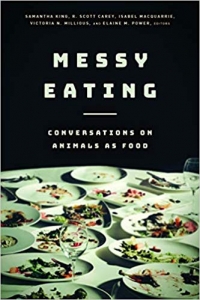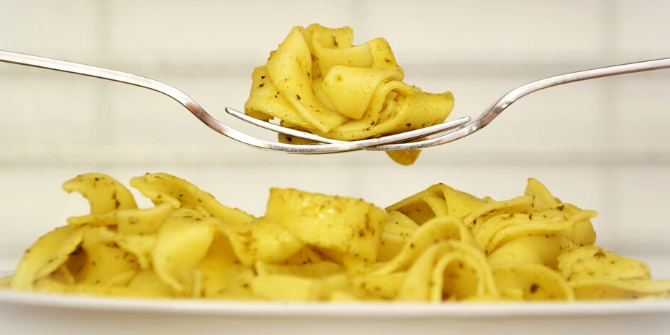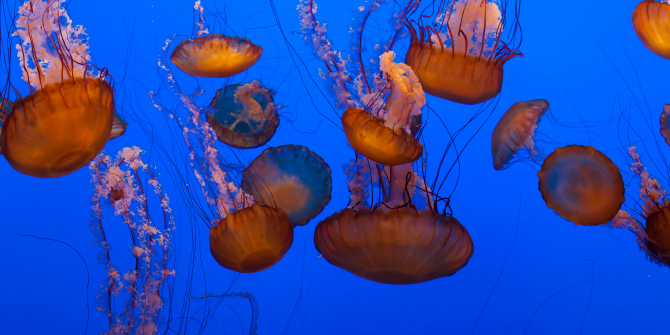In Messy Eating: Conversations on Animals as Food, Samantha King et al stage conversations with thirteen scholars working across multiple disciplines to discuss the consumption of animals and how their research is entangled with epistemological, ethical and political practices concerning multispecies relationships. The ‘messy’ interdisciplinary form of these collective reflections reveals how political and academic life converge and offers rich critiques of the binary between human and non-human animals as well as the limitations of Western ethnocentric perspectives, writes Anna Nguyen.
If you are interested in this book review, you may like to read this LSE News piece, ‘Veganism: Foodie Fad or Here to Stay?
Messy Eating: Conversations on Animals as Food. Samantha King, R. Scott Carey, Isabel MacQuarrie, Victoria N. Millious and Elaine M. Power (eds). Fordham University Press. 2019.
 Find this book (affiliate link):
Find this book (affiliate link): ![]()
What does ‘interdisciplinary’ mean? The word has a long history in academia; the term’s utility is typically acknowledged in discussing departmental norms, in boundary work, at conferences and in the creation of new fields that end with ‘studies’ (food studies, science and technology studies (STS) and communication studies are a few that quickly come to mind). Of course, the common understanding of interdisciplinary is the merging of theories and methods from more traditional disciplinary homes into ones that address the gaps that these may have missed. But citational practices, specifically in academia, indicate that interdisciplinarity can simply refer to a scholar’s favourite sources that are outside of her field.
The theme of interdisciplinarity and the use of ‘messiness’ as a concept are explored in the thoughtful collection of thirteen conversations that comprise Messy Eating. The title draws the reader’s attention to what the editors call critical interdisciplinary work among the editorial group and their collaborators (7), paying particular attention to how theory and politics – in personal and academic life – are mutually constitutive and converge. The editors conducted ‘interviews that explore how postcolonial, Indigenous, black, queer, trans, feminist disability, continental, phenomenological, posthumanist and multispecies theories shape approaches to consuming animals as food’, how their correspondents’ research is entangled with their epistemological, ethical and political practices and what this means for thinking about multispecies relationships (3). The interviewees are from various departments and disciplines, including cultural studies, sociology, Indigenous and feminist science studies, anthropology, law, comparative literature, philosophy, history, animal studies, disability studies, gender studies and American studies. Although the interviewees’ primary research interests may not necessarily be food or food studies, they frequently refer to the theme of animals as food and Donna Haraway’s body of work as common reference points (1-2).
In each chapter, the editors asked the chosen researcher some biographical information, where they were born and raised and their academic trajectory. When the topic of eating or how they became a vegetarian or vegan arises, the interview provides insight on how the interviewee’s personal experiences may have informed their preferences and created an ethical foundation for their own intellectual work. These little moments and vignettes make these experiential accounts accessible, especially when the interviewees talk about their formative years, how they were raised and how they prepare or shop for their food. Cary Wolfe (Chapter One) remembers his mother’s reaction to his vegetarianism during a Thanksgiving dinner, and how she considered it a personal attack on her role as a mother (31). Kim TallBear (Chapter Three) grew up in a hunting family, near the South Dakota reservation of the Flandreau Santee Sioux Tribe in Minnesota, but remembers not enjoying eating meat (61). When TallBear lived in Berkeley, she dismissed the local food cultures as a ‘Michael Pollan world’ until she experienced a wheat allergy herself (62). Anthropologist Naisargi Dave (Chapter Four) shares that she became a vegan to impress a woman when she was in college (76). And, as one would expect, critiques of colonial capitalism and power in current food systems and culture recur regularly.
 Image Credit: Pixabay CCO
Image Credit: Pixabay CCO
Another strong aspect of this volume is its exploration of alternatives to Western ethnocentric perspectives in academia. Scholars such as TallBear, Dave, Maneesha Deckha (Chapter Five) and Neel Ahuja (Chapter Ten) situate their cultural upbringings and how these inform their understanding of race, colonialism and animal studies. TallBear shares that she was raised to understand that animals have their own life trajectories (54), and Dave, Deckha and Ahuja all poignantly inform us just how different the categories of ‘vegetarianism’ or ‘veganism’ are in the context of Hindu cultures. In her discussion of nationalism, Dave observes that ‘the Hindu right is appalled by the slaughter of cows. So while vegetarianism is associated with right-wing politics, veganism is, at worst, associated with being Westernized. It has a different valence than vegetarianism’ (81). Sharon Holland highlights how her perspective is from a Black Atlantic ethical tradition, which is a way to discuss accountability and community in African Americanist discourse (213-14).
But it is how the scholars address the limitations of existing normative frameworks that are the most provocative and rich aspects of the book, as they serve as critiques of how to update the binary of human and non-human animals as a way to broaden our understanding of the social and address all of the material world. The editors write that they hope to bridge multiple frameworks that can move beyond the humanist perspective on the ethics and politics of food in human-animal relationships and the discourse on animal rights (3-5). The topic of humanist perspectives is indeed a divide, especially when we think of how to even talk about non-humans. In Chapter Two, sociologist Lauren Corman notes that her field assumes that its main concepts, namely society and culture, are exclusively human. She extends the use of intersectionality research to include animal voices as marginalised voices (42), or what Dave calls the intersectionality of critical animal studies (77). The connection of interdisciplinarity and intersectionality is further explored in Sunaura Taylor’s interview (Chapter Nine), who combines her activism work with disability and animal studies. Harlan Weaver addresses the difficulty in producing careful work based on the concerns of critical race studies and queer, gender and sexuality studies, and the danger of appropriating language from marginalised peoples (176).
Indeed, the question of language in our relationship with animals has long been a philosophical inquiry. In a seminal paper, ‘What is it like to be a bat?’, Thomas Nagel critiques the materialist and scientific reductionism of objectivity as a feeble exercise in the quest to understand the experiences of other animals. Instead, he argues we can only assume what bats might feel or experience, based on our own human experiences. Even if language has been, and is, a humanist practice or endeavour, comparative literature scholar Kari Weil suggests that reframing this concern as the question ‘is language patriarchal?’ (103) will better address how to reconfigure it. Weil further lays out her confusion with the word ‘posthumanism’, another term that recurs in this collection, and its many definitions. Her confusion is connected with the role of ethics, which she states is also a humanist endeavour, and what might be lost if we don’t reconsider what our humanness means (108-109).
As someone who does not sit comfortably in either food studies or STS, I really appreciate the unconventional (at least in the academic sense) genre this volume offers. The metaphor of ‘messy’ does not mean chaos; rather, these conversations highlight the scholarly task of filling in the gaps to rethink colonial scholarship. TallBear mentions that she does not crave intimacy with animals, but views her research as an intellectual and theoretical project that can strengthen new materialism and critical animal studies (60); Holland observes that just because theories are categorised as feminist or critical race studies does not necessarily mean that they are particularly good or critical enough (213). These are all significant points, and one should read these conversations as a place to connect similar concerns in different kinds of scholarly terrains; however, the question of normativity is one that cannot be displaced by the allure of interdisciplinarity. For those who are interested in object-oriented studies but with no real disciplinary home, these conversations do provide an indexical catalogue of themes or references.
In the end, the question of rethinking, reconfiguring and redefining is something that we have not settled in our own frustrations with decolonising actual academic practices. This particular volume centres the theme of animals as food or companion species in interviews that highlight personal experiences and how these inform the scholar’s own research. By hosting intimate conversations and collective reflection with the researchers, the editors have offered us something different, and not the standard journal article or academic book. If we praise this volume for its ‘messy’ interdisciplinary form, this shows us the wider value of academic accounts that utilise narrative or personal prose.
Note: This review gives the views of the author, and not the position of the LSE Review of Books blog, or of the London School of Economics and Political Science. The LSE RB blog may receive a small commission if you choose to make a purchase through the above Amazon affiliate link. This is entirely independent of the coverage of the book on LSE Review of Books.







